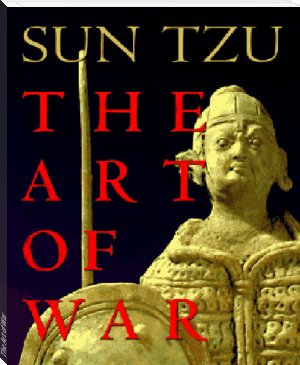The Art of War by Zi Sun (phonics reader .txt) 📖

- Author: Zi Sun
- Performer: 0976072696
Book online «The Art of War by Zi Sun (phonics reader .txt) 📖». Author Zi Sun
19. Hence, when able to attack, we must seem unable; when using our forces, we must seem inactive; when we are near, we must make the enemy believe we are far away; when far away, we must make him believe we are near. 20. Hold out baits to entice the enemy. Feign disorder, and crush him.
[All commentators, except Chang Yu, say, "When he is in disorder, crush him." It is more natural to suppose that Sun Tzu is still illustrating the uses of deception in war.]
21. If he is secure at all points, be prepared for him. If
he is in superior strength, evade him.
22. If your opponent is of choleric temper, seek to
irritate him. Pretend to be weak, that he may grow arrogant.
[Wang Tzu, quoted by Tu Yu, says that the good tactician plays with his adversary as a cat plays with a mouse, first feigning weakness and immobility, and then suddenly pouncing upon him.]
23. If he is taking his ease, give him no rest.
[This is probably the meaning though Mei Yao-ch`en has the note: "while we are taking our ease, wait for the enemy to tire himself out." The YU LAN has "Lure him on and tire him out."]
If his forces are united, separate them.
[Less plausible is the interpretation favored by most of the commentators: "If sovereign and subject are in accord, put division between them."]
24. Attack him where he is unprepared, appear where you are
not expected.
25. These military devices, leading to victory, must not be
divulged beforehand.
26. Now the general who wins a battle makes many
calculations in his temple ere the battle is fought.
[Chang Yu tells us that in ancient times it was customary for a temple to be set apart for the use of a general who was about to take the field, in order that he might there elaborate his plan of campaign.]
The general who loses a battle makes but few calculations beforehand. Thus do many calculations lead to victory, and few calculations to defeat: how much more no calculation at all! It is by attention to this point that I can foresee who is likely to win or lose.
[1] "Words on Wellington," by Sir. W. Fraser.
————————————————————————————————-
II. WAGING WAR[Ts`ao Kung has the note: "He who wishes to fight must first count the cost," which prepares us for the discovery that the subject of the chapter is not what we might expect from the title, but is primarily a consideration of ways and means.]
1. Sun Tzu said: In the operations of war, where there are in the field a thousand swift chariots, as many heavy chariots, and a hundred thousand mail-clad soldiers,
[The "swift chariots" were lightly built and, according to Chang Yu, used for the attack; the "heavy chariots" were heavier, and designed for purposes of defense. Li Ch`uan, it is true, says that the latter were light, but this seems hardly probable. It is interesting to note the analogies between early Chinese warfare and that of the Homeric Greeks. In each case, the war- chariot was the important factor, forming as it did the nucleus round which was grouped a certain number of foot-soldiers. With regard to the numbers given here, we are informed that each swift chariot was accompanied by 75 footmen, and each heavy chariot by 25 footmen, so that the whole army would be divided up into a thousand battalions, each consisting of two chariots and a hundred men.]
with provisions enough to carry them a thousand LI,
[2.78 modern LI go to a mile. The length may have varied slightly since Sun Tzu's time.]
the expenditure at home and at the front, including entertainment of guests, small items such as glue and paint, and sums spent on chariots and armor, will reach the total of a thousand ounces of silver per day. Such is the cost of raising an army of 100,000 men. 2. When you engage in actual fighting, if victory is long in coming, then men's weapons will grow dull and their ardor will be damped. If you lay siege to a town, you will exhaust your strength. 3. Again, if the campaign is protracted, the resources of the State will not be equal to the strain. 4. Now, when your weapons are dulled, your ardor damped, your strength exhausted and your treasure spent, other chieftains will spring up to take advantage of your extremity. Then no man, however wise, will be able to avert the consequences that must ensue. 5. Thus, though we have heard of stupid haste in war, cleverness has never been seen associated with long delays.
[This concise and difficult sentence is not well explained by any of the commentators. Ts`ao Kung, Li Ch`uan, Meng Shih, Tu Yu, Tu Mu and Mei Yao-ch`en have notes to the effect that a general, though naturally stupid, may nevertheless conquer through sheer force of rapidity. Ho Shih says: "Haste may be stupid, but at any rate it saves expenditure of energy and treasure; protracted operations may be very clever, but they bring calamity in their train." Wang Hsi evades the difficulty by remarking: "Lengthy operations mean an army growing





Comments (0)